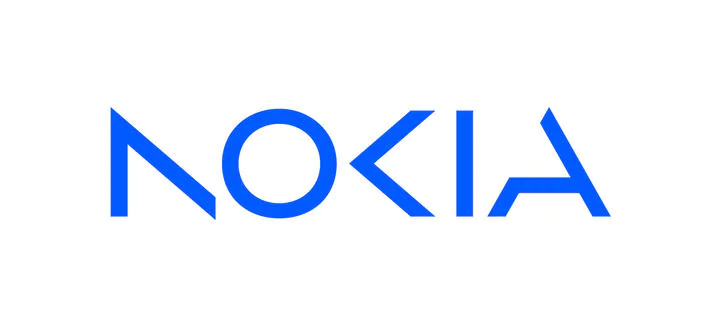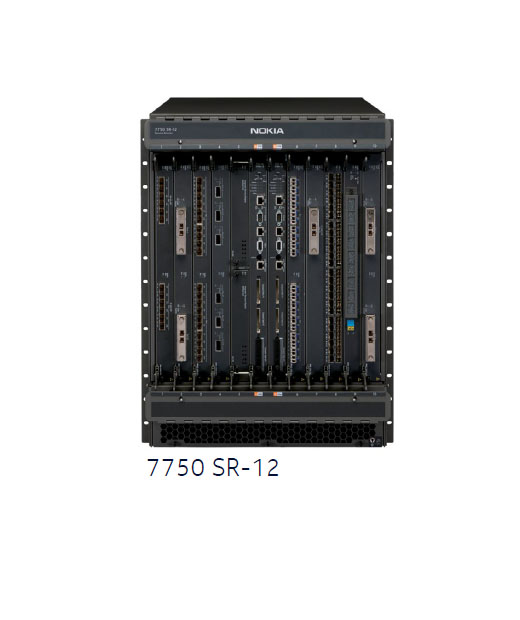Nokia 7750 SR-12
Service Router
As networks experience unprecedented traffic growth and unpredictable demands, operators are on a quest to meet ever-increasing performance requirements while rolling out new services quickly over a secure, self-defending network. The Nokia 7750 SR-12 addresses these imperatives, enabling operators to build a bigger, secure, automated and sustainable network with a superior return on investment.
Nokia 7750 SR Series Product Family
The Nokia 7750 SR series of IP routers delivers high performance with the speed, capacity, power efficiency, flexible capability, network security and automation tools essential for IP networking in the 5G and cloud era. With continuous design innovation and proven investment protection, the 7750 SR helps build an IP network that can evolve with changing needs for years to come.
With four variants, the 7750 SR scales capacity from 1.5 Tb/s full duplex (FD) up to 13.5 Tb/s FD and delivers performance certainty for demanding network roles. Universal QSFP-DD, QSFP28 and SFP28 connectors enable high-density 400GE, 100GE, 25GE and 10GE networking environments.
At the heart of the 7750 SR is Nokia 3.0 Tb/s FP4 silicon. A fully programmable network processor, it is fully deterministic and power efficient, enabling diverse deployment needs, and is essential for high performance routing. Powered by the comprehensive features of the Nokia Service Router Operating System (SR OS), the 7750 SR supports a full array of network functions and services. These industry-leading capabilities enable network designs without trade-offs among performance, capacity, scale and power consumption.
To protect against increasing security threats, the Nokia 7750 SR-12 takes a silicon-embedded approach to IP network security. Acting as a highly precise attack sensor and mitigation element, the 7750 SR makes the network part of the solution to help neutralize DDoS attacks — all without impacting router performance.
The Nokia 7750 SR product family consists of the Nokia 7750 SR series, the Nokia 7750 SR-s series, the Nokia 7750 SR-a series and the Nokia 7750 SR-e series.
Features & Benefits
-
Available in four system variants, the 7750 SR is highly scalable to fit in a variety of network locations and deployment models in high-density 10GE, 100GE and 400GE networking environments. The compact 7750 SR-1 is a modular, single-slot system supporting up to 1.5 Tb/s FD and up to 4.0 Tb/s FD with intelligent aggregation. It supports QSFP56-DD, QSFP28-DD, QSFP28, QSFP+, SFP28 and CFP2-DCO connectors along with flexible breakout options, including 10 x 10GE, 2 x 100GE and 4 x 100GE.
400GE IP-optical integration
- The 7750 SR is ready for the 400GE era. 400G ZR and 400G ZR+ pluggable transceivers are supported in QSFP56-DD form factors to optimize density and performance for high-capacity data center interconnect, metro and regional access, edge and core network applications. A standards-based generalized MPLS (GMPLS) usernetwork interface (UNI) enables IP-optical control plane integration, allowing the 7750 SR to efficiently coordinate IP routing and transport requirements across administrative boundaries and to dynamically set up optical segments and end-to-end transport connections.
- Power-efficient design innovations on the 7750 SR increase the sustainability of IP networks through reduced emissions. The FP4 chipset architecture enables line card designs with fewer FP4 complexes and fewer components on each board to lower power consumption. The FP4 memory architecture is also exceptionally power efficient. Power consumption scales with licensing level to drastically reduce power when only a fraction of a line card is in use. With Nokia FP4, these and other mechanisms are dynamic, enabling each 7750 SR system to automatically adapt to lower power consumption. FP4 silicon reduces power consumption by 50 percent over the previous generation Nokia FP3 silicon while offering up to six times more capacity. With the 7750 SR, this power reduction is realized with full capacity and features enabled and deterministic performance under all network operating conditions. Multiple license configurations, including intelligent aggregation and a choice of line card assembly options, give operators the flexibility to design network locations for power consumption along with performance, capacity and scale to achieve sustainability goals.
-
Network processor-based architecture
Every generation of FP silicon has been based on a network processor (NP) design. An NP offers the highest degree of flexibility and programmability in the industry. With a fully programmable data path, the data path is fully upgradable to new hardwarebased performance standards with a simple software update. Fixed-function silicon with pre-defined upgradability pales in comparison. Modern networks today rely on segment routing, EVPN, 1588 edge timestamping and countless other standards that were not conceived 10 years ago. FP’s NP-based architecture has been able to turn on these capabilities with hardware-based performance, eliminating the need for hardware-based upgrades. This is a true measure of programmability and investment protection. With uncertainty around future evolving network standards, an NP-based architecture delivers the lowest TCO compared to any other chipset architecture on the market.
Deterministic performance: Tables, buffers and QoS
FP4 is fully deterministic across tables and buffers under all network loading conditions. This enables performance certainty at full scale and under realworld network conditions. This capability is powered with line-rate packet processor intelligent memories coupled with fast buffer memories. Where other industry packet processors rely on non-line rate memories for buffering, for tables, or potentially for both, FP4 avoids their performance sacrifice to deliver 10 years of predictable performance. A line rate memory system will always outperform a non-line rate memory system under all network loading conditions without exception. FP4 is fully buffered with both deep line rate ingress and deep line rate egress buffers. It supports full packet pre-classification and pre-buffering in front of the packet processor equally, ensuring a superior level of performance for all critical flows and guarantees the traffic that matters most, regardless of port configuration. It supports a full set of QoS with up to eight queues per service, hardware-assisted H-QoS, and an industry leading total number of queues and policers to support all necessary QoS features from simple to complex in a highly granular way. QoS capabilities support tremendous capability for BNG and quad-play services but can equally be scaled to deliver optimized lean performance.
Pay-as-you-grow licensing
A flexible pay-as-you-grow licensing model for the FP4-based line card provides a choice of entry points for immediate requirements and the ability to scale in place for evolving needs with softwareonly upgrades. This provides cost savings, ensuring operators pay for only the required functionality. Capacity licenses provide bandwidth, connector density and intelligent aggregation mode options. Functional licenses scale services through control options on egress hardware queues and egress policers. Each FP4 line card supports multiple combinations of these licenses to cost-effectively scale capacity and functionality attributes while protecting hardware investments.
Intelligent aggregation
Intelligent aggregation is a capability that allows the 7750 SR to cost-effectively aggregate port capacity beyond the forwarding capacity of a delivered line card. The 7750 SR enables up to 4 Tb/s FD of intelligent aggregation per system and line card, and it does this in a deterministic way with full respect for QoS and packet priority. Intelligent aggregation allows for guaranteed QoS with full pre-buffering and pre-classification in front of our packet processor when used in an aggregation configuration. This enables the 7750 SR to collapse full layers of pre-aggregation in front of systems or, if ports are constrained on an edge or core node, to expand the number of available ports without adding more line cards and to continue to perform in a fully deterministic way under all network loading conditions. As a result, intelligent aggregation can be a significant driver of sustainability and both CAPEX and OPEX savings.
Highly scalable platform
Power efficiency for sustainability
Flexible capability







